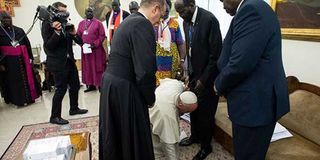Will Pope Francis’ kiss bring lasting peace to South Sudan?

Pope Francis kneels to kiss the feet of South Sudan's President Salva Kiir Mayardit at the Pope's Santa Marta residence in the Vatican on April 11, 2019. The pope called on the warring South Sudanese factions to respect the latest armistice. PHOTO | VATICAN MEDIA | AFP
What you need to know:
As Pope Francis was helped down to his knees, breathing heavily in the video clips showing the events of the day, the four South Sudanese leaders seemed dumbfounded and short of breath.
They could not believe that the head of easily the world’s most powerful religious institution was willing to show them utmost honour.
In a sense, the Pope was entering into a pseudo-spiritual covenant with the leaders, a binding agreement for them not to rescind on their word on keeping peace in South Sudan.
Under a fortnight ago, world media was abuzz with captivating images of Pope Francis down on his knees and kissing the feet of four South Sudanese leaders, namely President Salva Kiir Mayardit, Vice President Taban Deng Gai, former Vice President Riek Machar Teny Dhurgon, and former Cabinet Minister Mama Rebecca Nyandeng de Mabior, widow of the late Dr John Garang de Mabior, the long-time larger-than-life leader of the Sudan People’s Liberation Army/Movement (SPLA/M).
CIVIL WAR
The leaders were part of a South Sudanese delegation to the Catholic church’s seat of power at the Vatican in Rome, Italy, where they sought renewal in a spiritual pilgrimage of sorts.
The mere fact that the three men, President Kiir, Mr Deng Gai and Dr Machar – being the lead protagonists in the recently resolved civil war in Africa’s youngest country – were in the same room at the same time under peaceful circumstances was no mean feat.
Dr Machar and Mr Deng Gai started out on the same side, vehemently opposing President Kiir’s continued stay in power and his alleged refusal to hold internal elections within the SPLM, which was morphing from a liberation movement into a governing party. At the time, in 2013, Dr Machar was South Sudan’s Vice President, and as tension persisted between him and President Kiir, the Head of State accused his VP and 10 other leading SPLM figures of plotting a coup against him.
Dr Machar denied the allegations, eventually breaking away from the SPLM to form a splinter group, the SPLM-In-Opposition, otherwise known as SPLM-IO, of which Deng Gai was a prominent member. This factionalism resulted in the December 2013 civil war, which ended in 2015 with the Addis Ababa signing of a peace deal and an April 2016 unity government with Dr Machar as First Vice President.
Unfortunately, the peace deal couldn’t hold for long.
Four months later, fresh fighting ensued in Juba, resulting in Dr Machar fleeing and being deposed as First Vice President.
POLITICAL ELITE
His erstwhile comrade within the SPLA-IO, Deng Gai, who had been Dr Machar’s lead negotiator during the unity government talks, was then picked by President Kiir as the SPLM-IO representative to become Vice President, in a move aimed at splitting the opposition formation.
Dr Machar opposed Deng Gai’s appointment, arguing that the SPLM-IO had in fact fired Deng Gai as its lead negotiator. This didn’t deter President Kiir.
On fleeing Juba, Dr Machar ended up in the Democratic Republic of Congo, where he sought refuge before being airlifted by the United Nations for treatment in Khartoum, Sudan. Thereafter, Dr Machar was holed up in Pretoria, South Africa, where his movement was largely restricted.
However, his absence from South Sudan and his seeming incapacitation in Pretoria didn’t stop the fighting. This necessitated a concerted push by various parties for the return to the 2015 Addis Ababa agreement, with Juba pressurised through back channels by the likes of Raila Odinga, a known Dr Machar ally who, following his appointment as the African Union Special Envoy for Infrastructure Development – even if the South Sudan matter didn’t fall directly under his mandate – deployed his newfound clout within the Kenyan government and at the African Union to get things moving.
As a result of a plethora of interventions, a new deal was reached to allow Dr Machar and his SPLM-IO brigade to return to Juba last year, where he is expected to resume his role as First Vice President in a yet-to-be-constituted unity government. In their continued attempts to safeguard this latest ceasefire, the South Sudanese political elite, civil society and religious leaders – some of whom formed part of the Vatican delegation – have been pulling all tricks in the bag, including the visit to the Pope.
UTMOST HONOUR
As Pope Francis was helped down to his knees, breathing heavily in the video clips showing the events of the day, the four South Sudanese leaders seemed dumbfounded and short of breath, not believing that the head of easily the world’s most powerful religious institution was willing to show them utmost honour.
In a sense, the Pope was entering into a pseudo-spiritual covenant with the leaders, a binding agreement for them not to rescind on their word on keeping peace in South Sudan.
Addressing President Kiir, Dr Machar and Deng Gai, the Pope implored them saying, “To the three of you who have signed the peace agreement, I ask you as a brother, stay in peace. I am asking you with my heart, just go forward. There will be many problems, but they will not overcome us…’’
For now, all eyes are trained on the South Sudanese leadership, with the world hoping that the Pope’s kiss will do the magic which the hundreds of deaths and continued suffering of the battered people of South Sudan hasn’t been able to do over the years.





